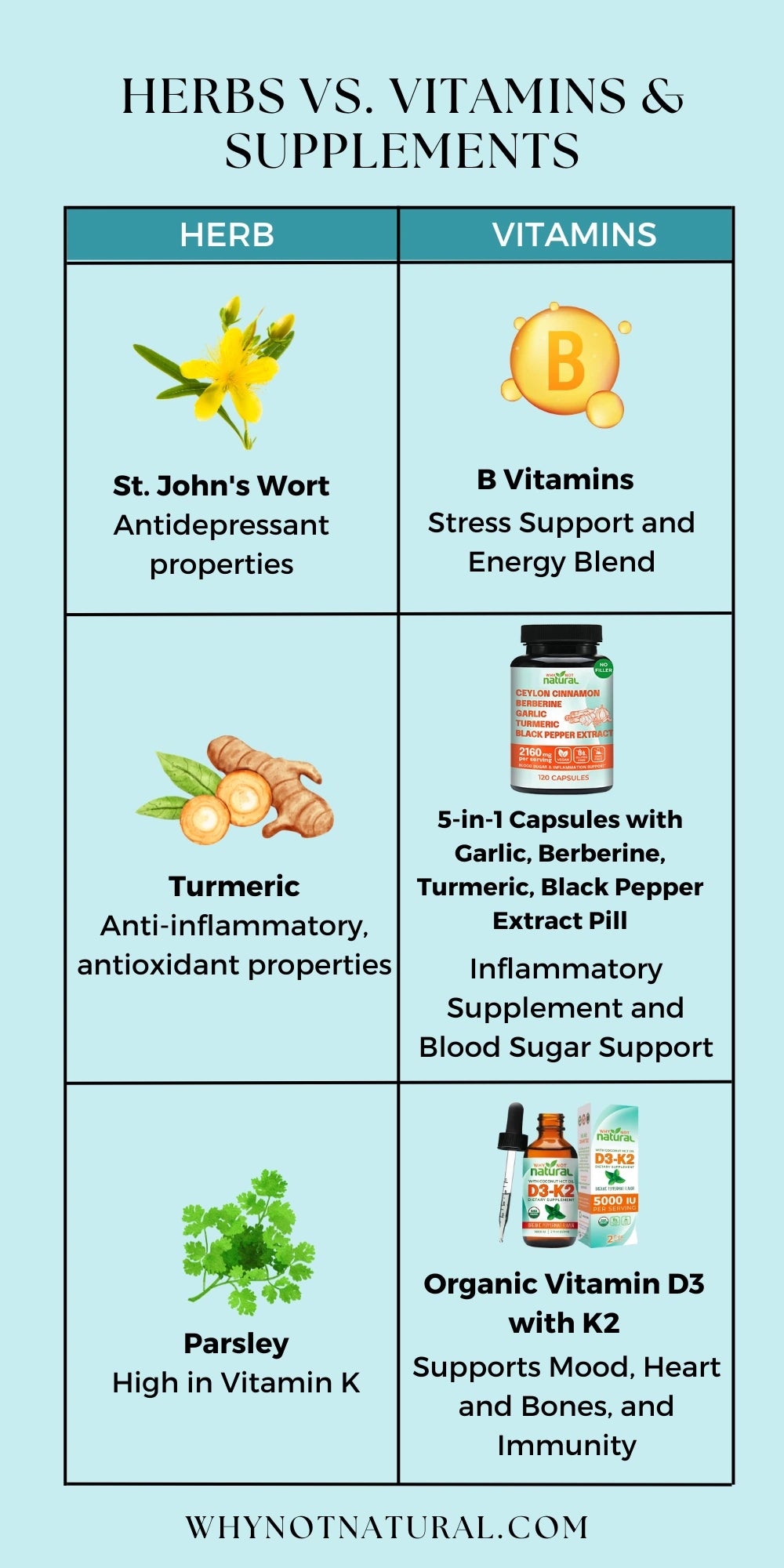

· By Kelin Marquet
Vitamins vs. Herbs: A Complete Guide to Their Differences and Therapeutic Uses
The world of health and nutrition is a vibrant and diverse arena filled with various substances that can support our well-being. Among these, vitamins and herbs are powerful tools, each having unique characteristics and potential benefits.
People often interchange the terms "herb" and "vitamin", but it's essential that you understand the difference between these two categories to harness their therapeutic potential fully. So, let's delve into the exciting world of vitamins and herbs!
Understanding Vitamins
The body requires vitamins for various essential functions. These organic compounds are categorized into two groups: fat-soluble (Vitamins A, D, E, and K) and water-soluble (B vitamins and Vitamin C). Unfortunately, our bodies can't typically produce enough of these vital substances (or can't produce any at all), so we need to obtain them through our diet or supplementation.
Vitamins play critical roles in the body, from energy production and bone health to immune function and blood clotting. For example, Vitamin D is needed for calcium absorption, vital for bone health, and a deficiency can lead to conditions like rickets or osteomalacia (1). Vitamin B12, on the other hand, plays a crucial role in nerve function, and its deficiency can cause anemia and neurological problems (2).
Apart from their physiological roles, vitamins can also have therapeutic uses. High doses of Vitamin C, for instance, have been studied for potential benefits in cancer treatment, with some studies suggesting its role in improving patients' quality of life (3).
The key takeaway about vitamins: they're essential and you can't live without them. If you want to just explore the benefits of various vitamin supplements, you can see Why Not Natural's collection here.
Herbs and Their Therapeutic Uses
Contrasting the uses of vitamins with herbs, which are plants or plant parts used for their scent, flavor, and therapeutic properties, the differences become apparent. Unlike vitamins, herbs contain various compounds that can exert therapeutic effects.
These compounds can interact with our bodies in complex ways, and their benefits can range from anti-inflammatory and antioxidant effects to potential benefits for mental health.
For example, St. John's Wort has been extensively researched and is commonly used for mild to moderate depression (4). Likewise, curcumin, a compound found in the herb turmeric, has been studied for anti-inflammatory and antioxidant properties, showing potential in managing conditions like arthritis and metabolic syndrome (5).
The Why Not Natural 5-in-1 inflammation and blood sugar capsules (here) are a great example of the power of herbs. While you can certainly live without these 5 herbs, they can greatly improve your quality of life, naturally.
While some studies suggest promising results, the therapeutic use of herbs is a complex field, and many aspects are still being researched. You must consult with a healthcare provider before starting any new herbal regimen because unlike many vitamins, herbs often interact with medications.
Are Herbs Vitamins or Do They Contain Vitamins?
Here's where the lines blur a little. Herbs are not vitamins, but they can contain vitamins. For instance, parsley is a herb high in Vitamin K, an essential nutrient for blood clotting. Similarly, Rosehips, which are often used in herbal teas, are high in Vitamin C.
Vitamins, on the other hand, don't typically include herbs - however, supplements containing vitamins can. For example, the Why Not Natural vitamin D3-K2 capsules (here) are packed in spirulina, an herb.
Example Benefits and Uses of Vitamins and Herbs
| Vitamins/Herbs | Benefits | Uses |
|---|---|---|
| Vitamin A | Supports eye health, immune system | Night blindness, immunity support |
| Vitamin D | Supports bone health, immune system | Osteoporosis, rickets, immune support |
| Vitamin B12 | Essential for nerve function, red blood cell formation | Anemia, neurological support |
| St. John's Wort | Antidepressant properties | Mild to moderate depression |
| Turmeric (Curcumin) | Anti-inflammatory, antioxidant properties | Arthritis, metabolic syndrome |
| Parsley | High in Vitamin K | Used in various cuisines, potential benefits for bone health |
Can I use herbs and vitamins together?
Yes, you can use herbs and vitamins together, and many people do so for a comprehensive approach to their health. However, some herbs and vitamins can interact (and can interact with medication), so it's crucial to consult your healthcare provider before starting a new regimen.
How do I know if I need to supplement with vitamins or herbs?
This largely depends on your health status, diet, lifestyle, and medical conditions. Routine blood tests can reveal vitamin deficiencies. For herbs, it's more about managing specific conditions or symptoms. Always consult with a healthcare provider to understand what's best for your situation.

Conclusion
While vitamins and herbs can both contribute to health and well-being, they play different roles and offer distinct benefits. Understanding these differences allows us to make informed decisions about our health. Remember, before starting any new supplement regimen, whether it's vitamins or herbs, always consult with a healthcare provider.
Don't forget to subscribe to our newsletter to learn which supplements to take, how to combine them for maximum benefit, and other health tips to boost your energy and vitality. Plus, discover natural strategies to reduce hormonal imbalances, stress, and anxiety. Click here to get started!
References:
- Holick, M. F. (2007). Vitamin D deficiency. New England Journal of Medicine, 357(3), 266-281.
- Hunt, A., Harrington, D., & Robinson, S. (2014). Vitamin B12 deficiency. Bmj, 349, g5226.
- Carr, A. C., & Maggini, S. (2017). Vitamin C and immune function. Nutrients, 9(11), 1211.
- Linde, K., Berner, M. M., & Kriston, L. (2008). St John's wort for major depression. Cochrane Database of Systematic Reviews, (4).
- Daily, J. W., Yang, M., & Park, S. (2016). Efficacy of turmeric extracts and curcumin for alleviating the symptoms of joint arthritis: a systematic review and meta-analysis of randomized clinical trials. Journal of medicinal food, 19(8), 717-729.
